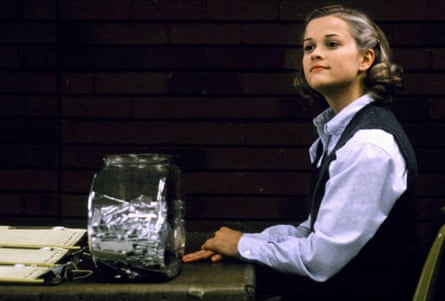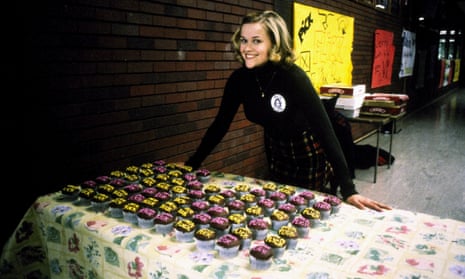There’s a big M Night Shyamalan twist in the final minutes of Election, Alexander Payne’s searing 1999 high school satire. Tracy Flick, the irritating overachiever indelibly played by a breakout Reese Witherspoon, is a Republican.
Throughout the film, Payne prefers to think about politics in the abstract, as an illusory choice between interchangeable versions of the same bullshit. Odious civics teacher Jim McAllister (Matthew Broderick) explains democracy as having the option to select either an apple or an orange, represented with two identical circles on his chalkboard. The closest thing that this comedy of bad morals has to a hero is Tammy Metzler (Jessica Campbell), who galvanizes the student body with a promise to dissolve the school government in toto if elected class president.
Payne narrows his blanket contempt for the two-party system in only one moment, just short of the credits. After McAllister has torpedoed his professional and romantic lives by sabotaging Tracy’s campaign for office at Carver high, after the scandal’s dust has died down, he engineers a second act for himself in New York City as a museum guide. He encounters Tracy years later in Washington DC, where he glimpses her getting into a limo as a staffer to the fictitious Representative Mike Geiger, identified as a Nebraska Republican. A minor detail, perhaps, but for a character as invested in the trajectory of her own future as Tracy, it’s a significant one. Payne doesn’t like picking sides, he’d rather withdraw in disgust, so it stands out that he picks one for her.
In her school days, Tracy Flick is “political” in the same holistic, imprecise sense that Burning Man attendees can be “spiritual” without subscribing to any formal religion. She’s invigorated by the nuts and bolts of the voting process, and as is the case with all of her numerous extracurriculars, she throws her entire self into running for class president. But the dirty secret about résumé-padders like Tracy is that their only real commitment is to the act of staying involved. It’s not like dictating lunch block policy requires a nuanced platform, and still her stump speech goes heavy on upbeat vagaries over substance. She imitates the habits of studied politicians, hitting her cadences and singling out her working-class constituents to score pathos points.
All the while, her focus remains on success rather than any particular ideology that might take her there. Her bedroom walls are adorned not with posters of inspirational women, but with her own awards and motivational platitudes like “Catch a dream and run with it!” and “If you can imagine it, you can achieve it!” Her mother, a divorcee channeling all her vicarious hopes into her daughter, spends her spare time writing letters to Connie Chung and, more tellingly, Republican leader Elizabeth Dole. In the intervening years between graduation day and the pathetic DC run-in – in an act of impotent rebellion, McAllister hurls a soda at Tracy and Geiger’s car, then scampers away towards the White House – it’s easy to see Tracy rising through the ranks of the GOP, where ruthlessness and an unslakable thirst for power are just habits of highly effective people.

Which makes it all the more curious that posterity has cast Tracy Flick as an avatar for liberalism. At the time of the original release in 1999, audiences already knew to read Tracy as a stand-in for Hillary Clinton; Witherspoon herself has reinforced the comparison, claiming just last year that she would never portray Clinton in a movie because she already had. Clinton herself has told the star that even 20 years out, people still ask her about Election all the time. These details were foregrounded in essays around the 2016 lead-up to the Presidential vote, pieces with titles like The Very Uncomfortable Experience of Rewatching Election in 2016 and Hillary Clinton, Tracy Flick, and the Reclaiming of Female Ambition.
These articles identified Tracy Flick as a vessel for a determination and self-sufficiency that frightens men when not actively offending them, a reading more than borne out by the film’s active interest in exposing the ugliest, pettiest sides of the adults undermining and taking advantage of her. (She’s introduced mid-affair with a lecherous married teacher; later, McAllister fetishizes her severity during sex with his own wife.) Tracy’s been wronged, the argument goes, devolving into a cudgel that male commentators can use to trivialize preparedness and perfectionism in distaff candidates. Tracy’s only sin, by the ethical calculus of this reappraisal? “She cares, about her own interests and those of everybody else, so insistently, and so aggressively – indeed, so ambitiously – as to blur the line between the two.”
That’s a generous assessment of a character who thinks to herself: “Now that I have more life experience, I feel sorry for Mr McAllister. I mean, anyone who’s stuck in the same little room, wearing the same stupid clothes, saying the exact same things year after year for all of his life, while his students go on to good colleges and move to big cities and do great things and make loads of money – he’s gotta be at least a little jealous. It’s like my mom says, the weak are always trying to sabotage the strong.” She’s smug and annoying and surprisingly entitled for someone resentful of the upper class, and yet she has the upper hand by not being a serially dishonest pedophile. Tracy doesn’t have to be good for the men around her to be worse.
That’s the disillusioned soul of the film, entrenching it within the cynicism of the 90s and estranging it from the hopeful revisionism of modern discourse. Election hones itself into a war of attrition between an actively terrible person and one who is just obnoxious enough to keep an audience at arm’s length. A foil for Tracy arrived in the form of Parks and Recreation’s Leslie Knope, another irrepressible go-getter with an eye for climbing the governmental ladder. Except that her always-on energy and tireless devotion to work earned her lots of friends as it boosted her up the chain of command, a fittingly optimistic rework for the hope-fueled Obama administration and Clinton candidacy. What makes Election special, and thoroughly alien to entertainment in 2019, is its refusal to give Tracy any leeway. If she’s going to gain the political foothold she so desperately craves, she will have to shack up with the neocons to do so. Bleak, sure, but at least Payne’s honest.
